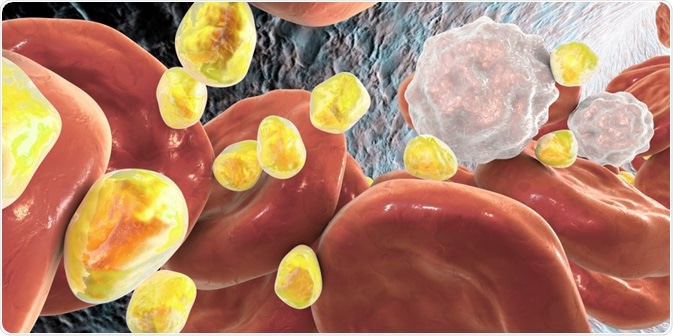Hypertriglyceridemia refers to an abnormally high level of triglycerides in the blood. Found in both animal and vegetable fats, triglycerides make up about 95% of all dietary fats. Once digested, triglycerides circulate in the bloodstream and are used as a source of energy by cells. Any triglycerides that are not taken up as an energy source are stored as fat, to provide energy in between meals.
 Image Credit: Kateryna Kon / Shutterstock.com
Image Credit: Kateryna Kon / Shutterstock.com
In many cases, overeating on a regular basis can lead to becoming overweight or obese. This can lead to a raised triglyceride level, which is associated with an increased risk of health conditions including diabetes, heart disease, and stroke.
A simple blood test called lipoprotein analysis can be used to assess a patient’s lipid profile, which includes an assessment of the triglyceride level. A normal triglyceride level is less than 150 mg/dL, while 150 to 199 mg/dL represents a borderline level, 200 to 499 mg/dL a high level and 500 mg/dL or above a very high level.
Hypertriglyceridemia is usually symptom-free until the triglyceride level reaches extremely high levels, of above 1000 mg/dL. At this point, some of the signs and symptoms that may be seen include the following:
- Gastrointestinal pain
- Xanthelasmas - yellowish fat deposits on or around the eyelids
- Corneal arcus - a thin, whitish or grey arc around the outer part of the cornea
- Xanthomas - yellowish deposits of fat under the skin found on the back, chest, buttocks or proximal extremities.
- Difficulty breathing
- Memory loss
- Dementia
- Pancreatitis, which causes severe abdominal pain, nausea, vomiting, fever and loss of appetite
Treatment of hypertriglyceridemia
Initial treatment strategies for patients with raised triglycerides involve lifestyle and diet changes. These include:
- Losing weight and maintaining a healthy weight.
- Exercising regularly
- Restricting alcohol intake
- Quitting smoking
- Maintaining a target blood sugar level in cases of diabetes
- Limiting intake of carbohydrates and unhealthy fats
Diet for hypertriglyceridemia
Patients are encouraged to follow a heart-healthy diet that is low in saturated fats and sugar and rich in fruits, vegetables, whole grains, lean meats, fish and low fat or fat-free dairy foods. Refined and processed grains such as white pasta, bread and rice should be limited, along with alcohol consumption. Saturated fats and trans-fats should be avoided and substituted with omega-3 fatty acids, which are found in fish such as salmon, mackerel, herring and sardines. Eating these oily fish or taking omega-3 in the form of supplements can help to lower the triglyceride level and promote heart health.
Medications
In addition to these lifestyle changes, a patient may also require medication to bring their triglyceride level down. If the triglyceride level is only mildly or moderately high, one of the following may be prescribed:
Fibrates
These significantly lower triglycerides as well as sometimes raising the level of high-density lipoprotein (HDL) or “good” cholesterol. Examples of these drugs include gemfibrozil and fenofibrate.
Niacin or vitamin B3
When taken at doses of 1,000 to 3,000 mg per day, niacin can reduce the level of triglyceride and low-density lipoprotein (“bad” cholesterol), as well as raising HDL cholesterol. This dose applies to immediate-release versions of the drug, which may be prescribed or available as a supplement. Sustained-release niacin is bought as a supplement only and the dose should not exceed 2,000 mg per day due to the risk of liver damage.
Omega 3 fatty acids
High doses of docosahexaenoic acid (DHA) and eicosapentaenoic acid (EPA) can treat a high triglyceride level. These polyunsaturated fats are found in fatty fish such as salmon and high doses of omega-3 fatty acids are found in fish oil supplements.
Statins
Statins are mainly used to lower LDL levels, but they can also lower triglycerides.
In cases where patients have a triglyceride level of above 1,000 mg/dL, the first treatment choice is a fibrate, which may be accompanied by a statin. Treatment with a statin alone is not recommended if the hypertriglyceridemia is severe or very severe. Fibrates are more effective at lowering triglycerides, although they cannot be prescribed to people who have developed gallbladder disease or liver disease.
A doctor will also check for any other conditions that may underlie the raised triglyceride level such as poorly controlled diabetes, kidney disease, hypothyroidism or certain medications. Some medications a doctor may have to stop prescribing because they can raise triglycerides are listed below:
- Beta-blockers
- Protease inhibitors for HIV
- Corticosteroids
- Some antipsychotics
- Some cholesterol-lowering drugs
- Estrogen therapy
- Thiazide diuretics
- Isotretinoin for acne
- Immunosuppressants
References
Further Reading
Last Updated: Mar 4, 2021